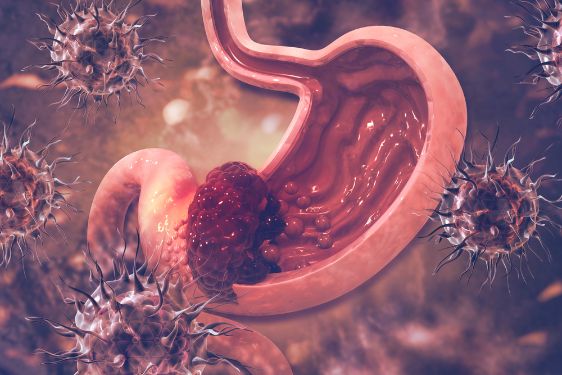Stomach cancer (also called gastric cancer) happens when stomach cells change and grow out of control, forming a tumour. It can also spread to other parts of the body. If the cancer is found in its early stages, it can often be cured. But it’s important to recognize and understand the symptoms of stomach cancer so you can see your healthcare provider right away.
The stomach is a muscular J-shaped organ that holds and breaks down food. Symptoms of stomach cancer may include feeling full after eating a small amount or pain in your upper abdomen. Stomach cancer usually starts in the cells that line the inside of your stomach. If the cancer grows, it can break through the layer of cells that lines your stomach and enter the muscle layer underneath. Cancer in the stomach can also spread to other areas of your body through the bloodstream or lymphatic system.
Stomach cancers vary in how fast they grow and what type of tissue they start in. Your doctor will work out a plan for treatment after looking at the stage of your cancer, how it’s growing and whether it has spread. They’ll also look at your age, medical history and general health when working out a prognosis.
If a tumour hasn’t grown into the muscle layer of your stomach, surgery can cure it. But if the tumour has grown into this area, or has spread to nearby tissues and lymph nodes, you’ll have different treatment options.

Most stomach cancers are classified as stage 0. These types of tumours start in the inner lining of your stomach and don’t spread very far. Your doctor might remove part or all of your stomach, as well as nearby lymph nodes (small organs that are part of the body’s germ-fighting system). You’ll probably have chemotherapy before surgery to shrink the tumour and afterwards to kill any remaining cancer cells. This is called neoadjuvant chemotherapy.
Other treatments might include placing a thin metal tube (called a stent) between your stomach and esophagus, or between your stomach and the small intestine to keep them apart. You might have a combination of radiation and chemotherapy. And you might get immunotherapy — drugs that help your immune system attack the cancer cells.
The type of treatment you get will depend on the stage of your cancer, where it is now and what kind of cell it is. Your doctors will talk about this with you in detail and explain any risks or side effects you might have. They’ll also discuss palliative care to manage your symptoms and improve your quality of life. This might include taking medicine to control your pain, nausea and other symptoms, as well as helping you eat and drink as much as possible. You’ll have regular check-ups to make sure your cancer is treated. Your doctors will tell you what to expect at each visit. They might explain your treatment in more than one way and give you time to think about it before making any decisions.








